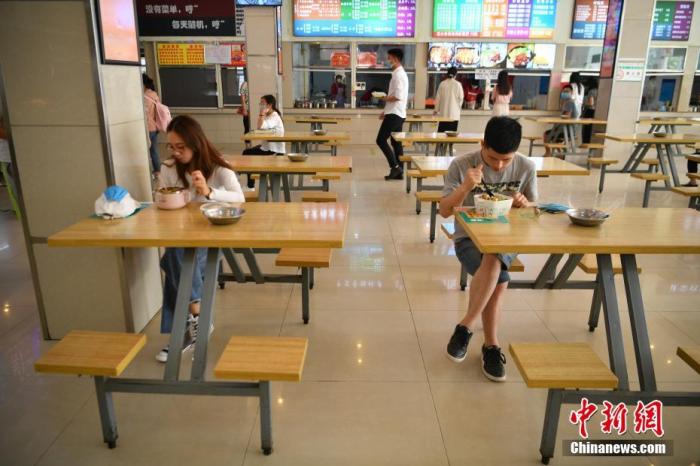China News Service, June 4th, 4th, the Ministry of Education website publishes the school's advocacy of civilized health, green and healthy lifestyle under the premise of normalizing the prevention and control of the new coronary pneumonia epidemic. The content proposes to have good hygienic habits and promote a meal-sharing system, and not to use public spoons and chopsticks when meals cannot be divided. Try to bring your own tableware when dining at school.
Data map: School cafeteria. China News Service reporter Liu Ranyang
In order to summarize the effective practices that need to be maintained for a long time in the prevention and control of the epidemic, the Ministry of Education's Office of the Leading Group for New Coronary Pneumonia Epidemic Work Entrusted the Chinese Academy of Education and relevant experts to propose a normalized prevention and control of the new coronary pneumonia epidemic. Advocating a green and healthy new lifestyle, guiding the majority of teachers and students to maintain a civilized and healthy lifestyle formed during the epidemic prevention and control after comprehensive resumption of school and classes, with prevention as the mainstay, moving forward, staying away from disease, and living a healthy life.
One is a healthy lifestyle. Reasonable arrangements for study, life, physical exercise, work and rest, regular work and rest, to ensure adequate sleep and enhance body immunity. Actively participate in sports, promote physical fitness, exercise will quality, and cultivate exercise habits. Master the common sense of eye care and eye protection, learn to identify the bad eye environment, and actively choose the environment that is beneficial to eye health. Pay attention to maintaining mental health, promote social adaptation, encounter psychological problems, learn to self-regulate, and actively seek professional psychological help and support when necessary. Maintain a healthy weight and avoid being overweight, obese and wasting. Stay away from tobacco and alcohol, put an end to Internet addiction, and refuse the temptation of drugs.
The second is good hygiene. Wash your hands frequently and use the "seven-step" hand-washing method. Wash your hands with soap, hand sanitizer and running water for at least 20 seconds. Take regular baths and do not share towels and toiletries. Brush your teeth scientifically, rinse your mouth after meals, and check your mouth regularly to prevent dental caries and keep your mouth healthy. Promote a meal-sharing system and use public spoons and chopsticks when meals cannot be divided. Try to bring your own tableware when dining at school.
The third is a balanced nutritional meal. Balanced nutrition and reasonable meals. Actively reduce the intake of salt, sugar and oil, increase the intake of high-quality protein and fresh vegetables and fruits. Drink plenty of water every day and drink less or no sugary drinks.
The fourth is healthy and civilized behavior. Love nature, love animals, and refuse to eat wild animals. Keep a suitable and safe distance, and keep a distance of more than one meter with others when talking, waiting, waiting for elevators, waiting in line. Consciously insist on safe and civilized travel, wear masks on public transportation, and do not eat in public transportation. Talk about civilization, hygiene, and don't spit. Cover your nose and mouth with a tissue or cover it with your elbows when sneezing or coughing. Others take the initiative to avoid flash when sneezing or coughing.
Fifth, maintain environmental hygiene. Frequently open windows for ventilation to keep indoor air flowing. Consciously participate in garbage classification and improve the living environment. Protect the environment and resources, reduce the use of disposable tableware, reduce pollution and waste.
Sixth, scientific medicine. Vaccination according to regulations to prevent infectious diseases. Discover infectious diseases, report early, isolate and treat early. Reasonable use of health service resources around schools and families. Wear a mask when you have a fever or suffer from a respiratory illness, consult a doctor in time, cooperate with a doctor for treatment, follow the doctor's instructions, and do not use prescription drugs without authorization.

